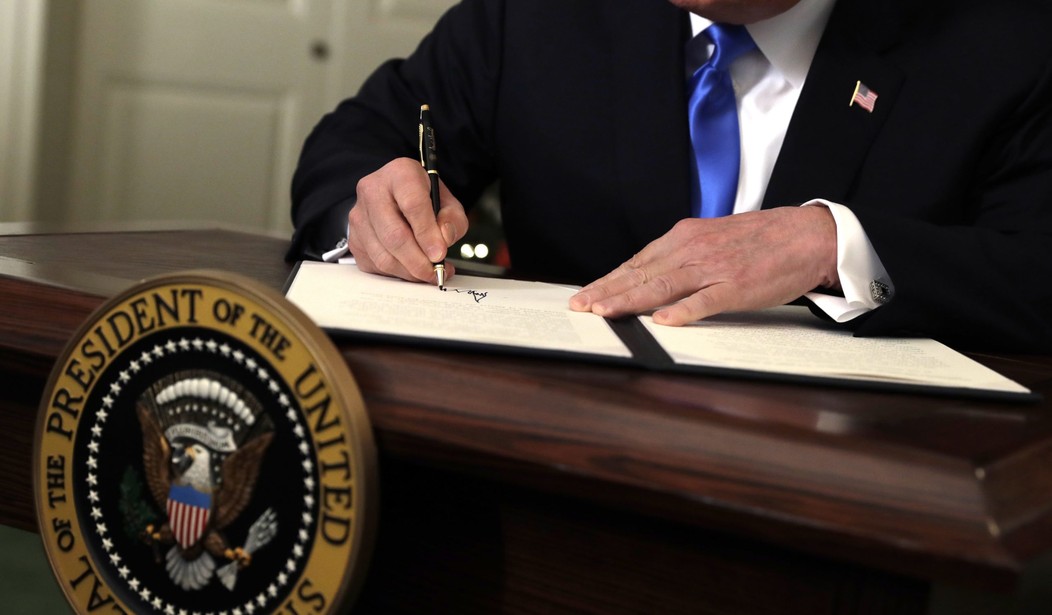In the last 12 months, U.S.-backed combat operations drove ISIS from its last bits of territory. America withdrew from the Paris agreement on climate change, UNESCO, and the Trans-Pacific Partnership. The House and Senate have come within sight of overhauling the tax code and dismantling Obamacare. Most recently, Donald Trump — in a spectacular departure from his predecessor’s Middle Eastern diplomacy — has moved the U.S. embassy in Israel to Jerusalem.
It is as if a hurricane has swept through Washington. Each fallen pillar represents a very deliberate reversal of the status quo ante policies of Barack Obama. The entire edifice the former president erected in his eight years in office is in the process of being systematically demolished. Unsurprisingly, Crain’s Chicago Business reporter Greg Hinz reported a very unhappy former president warning that Trump was nothing less than a new McCarthy, Nixon, or Hitler while speaking at the Economic Club of Chicago:
Obama said the United States had survived tough times before and could do so again, mentioning the age of McCarthyism and the attempted impeachment of former President Richard Nixon as examples. …
[He] urged the country not to “grow complacent,” saying … “things could fall apart quickly.” Hinz writes Obama then brought up the specter of Adolf Hitler, who came to power in Democratic Germany amid the financial crisis of the 1930s. “Sixty million people died … ” he reports Obama said. “So, you’ve got to pay attention. And vote.” …
Hinz called the comments “remarkable” and framed them as a rebuke of current president Donald Trump.
What Obama understandably neglected to mention was that a substantial percentage of American voters elected Trump precisely to undertake that teardown, an endeavor referred to as draining the swamp, aimed at nothing less than shrinking the size of government and breaking the perceived power of the elite. The commitment to that goal is reflected in the Deplorables’ willingness to ignore the media: “Nearly half of voters, 46 percent, believe the news media fabricate news stories about President Donald Trump and his administration, according to a new POLITICO/Morning Consult poll. … More than 3/4 of Republican voters, 76 percent, think the news media invent stories about Trump and his administration.”
Opposed to the Deplorables are “liberals turned radicals” called the “Resistance.” In the words of the New York Times, “Donald Trump’s election inspired such moral revulsion and political outrage that … parts of the American electorate had taken to calling themselves ‘the resistance,’ evoking the guerrillas who took to the hills and fought the Nazis during World War II … self-styled revolutionaries.”
After a period of sheer disbelief these liberal revolutionaries are now going head to head with the Deplorable rebels. The game’s afoot and nobody can easily call it off.
Which will win has yet to be determined by history. All one can do is compare their present strengths and strategies. In the matter of strength there should be no contest. A survey of federal government employees has the liberals over the Deplorables by almost 19 to 1. Over 99% of Department of Education employees backed Hillary. Trump’s best showing was in the Department of Defense — and even there Hillary had 84% of contributions. Add to this the liberal dominance in the media (93%) and academe (92%) and in Big Silicon, and it should be a case of progressive Goliath walking over conservative David.
Yet for a variety of reasons, the contest is much closer than the liberals could have imagined. Even the term “Resistance” implicitly accepts the status of equality if not actual inferiority. One possible explanation for the surprising competitiveness is the existence of some weakness which prevents liberals from generating their nominal power potential. In fact, the inability of the Resistance to generate net thrust is indirect confirmation that the toxic lying, wasteful spending, institutional incompetence, and ideological madness of which they have been accused are at least partially true.
Though they won’t admit it, they’ve realized this. This quiet acceptance has driven their strategy. The Resistance’s need to rid itself of weakness explains the choice of rectification, also known as purge, as a major activity. Purges have traditionally been used by “progressive” movements to rid themselves of “undesirables.” In 2017 the purge took two forms. The first was directed against the Clinton wing of the Democratic Party, and the second became a vigorous, almost hysterical campaign against sexual predators in liberal ranks. The need to clear the decks was so great that even liberal politicians like Al Franken and John Conyers find themselves reclassified as expendable.
In a wider context, the stakes in the conflict between the Deplorables and the Resistance are probably higher than either realize. Apart from who wins in their dispute against each other, both sides are also in contention with the challenges of the world. The dangers of war, runaway advanced technology, natural disaster, and economic downturn are never far away from either.
The idea that politics was settling into some singleton framework supported by an historically inevitable permanent majority proved illusory. Obama may have been right in his Chicago speech to warn of danger, but not in the way that he meant. The danger grew in his time in office. The status quo ante over which he presided was complacent. It was already falling apart. He just never saw it, until this remarkable year.
Follow Wretchard on Twitter
For a list of books most frequently purchased by readers, visit my homepage.
Support the Belmont Club by purchasing from Amazon through the links below.
Books:
The Fleet at Flood Tide: America at Total War in the Pacific, 1944-1945, by James D. Hornfischer. From the historian who has been acclaimed as “doing for the Navy what popular historian Stephen Ambrose did for the Army,” here is an unprecedented account of the extraordinary World War II air, land, and sea campaign that brought the U.S. Navy to the apex of its strength and marked the rise of the United States as a global superpower.
The Storm Before the Storm: The Beginning of the End of the Roman Republic, Author Mike Duncan brings to life the bloody battles, political machinations, and human drama that set the stage for the fall of the Roman Republic. Chronicling the years 146-78 BC, he showed how, abandoning the ancient principles of their forbears, men like Marius, Sulla, and the Gracchi brothers set dangerous new precedents that would start the Republic on the road to destruction and provide a stark warning about what can happen to a civilization that has lost its way.
Grant, by Ron Chernow. This book is a grand synthesis of painstaking research and literary brilliance that makes sense of all sides of Grant’s life, explaining how this simple Midwesterner could at once be so ordinary and so extraordinary. Named one of the best books of the year.
Leonardo da Vinci, by Walter Isaacson. This biograpy of history’s most creative genius is based on thousands of pages from Leonardo’s astonishing notebooks and new discoveries about his life and work. Isaacson weaves a narrative that connects his art to his science and shows how Leonardo’s genius was based on skills we can improve in ourselves, such as passionate curiosity, careful observation, and an imagination so playful that it flirted with fantasy.
For a list of books most frequently purchased by readers, visit my homepage.
Did you know that you can purchase some of these books and pamphlets by Richard Fernandez and share them with your friends? They will receive a link in their email and it will automatically give them access to a Kindle reader on their smartphone, computer or even as a web-readable document.
The War of the Words, Understanding the crisis of the early 21st century in terms of information corruption in the financial, security and political spheres
Rebranding Christianity, or why the truth shall make you free
The Three Conjectures, reflections on terrorism and the nuclear age
Storming the Castle, why government should get small
No Way In at Amazon Kindle. Fiction. A flight into peril, flashbacks to underground action.
Storm Over the South China Sea, how China is restarting history in the Pacific
Tip Jar or Subscribe or Unsubscribe to the Belmont Club









Join the conversation as a VIP Member